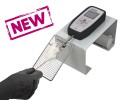Authors
RM Ritzel, SJ Doran, EP Glaser et al
Lab
Department of Anesthesiology and Center for Shock, Trauma and Anesthesiology Research (STAR), University of Maryland School of Medicine, Baltimore, MD, USA
Journal
Neurobiology of Aging
Abstract
After traumatic brain injury (TBI), individuals aged over 65 years show increased mortality and worse functional outcomes compared with younger persons. As neuroinflammation is a key pathobiological mechanism of secondary injury after TBI, we examined how aging affects post-traumatic microglial responses and functional outcomes. Young (3-month-old) and aged (18-month-old) male C57Bl/6 mice were subjected to moderate-level controlled cortical impact or sham surgery, and neurological function was evaluated. At 72 hours after injury, brain, blood, and spleen leukocyte counts were assessed ex vivo using flow cytometry. Aged mice demonstrated more severe deficits in forelimb grip strength, balance and motor coordination, spontaneous locomotor activity, and anxiety-like behavior. These animals also exhibited more robust microglial proliferation and significantly higher numbers of brain-infiltrating leukocytes. Microglia in aged mice showed impairments in phagocytic activity and higher production of interleukin-1_ (IL-1_). Infiltrating myeloid cells in aged TBI mice also had deficits in phagocytosis but showed diminished proinflammatory cytokine production and greater reactive oxygen species production. Expression of several senescence markers (Bcl-2, p16ink4a, p21cip1a, lipofuscin, and H2AX [pS139]) was increased with age and/or TBI in both microglia and injured cortex. Although there was no difference in the number of circulating blood neutrophils as a function of age, young mice exhibited more pronounced TBI-induced splenomegaly and splenic myeloid cell expansion. Thus, worse post-traumatic behavioral outcomes in aged animals are associated with exaggerated microglial responses, increased leukocyte invasion, and upregulation of senescence markers.
BIOSEB Instruments Used:
Grip strength test (BIO-GS3)

 Douleur - Allodynie/Hyperalgésie Thermique
Douleur - Allodynie/Hyperalgésie Thermique Douleur - Spontanée - Déficit de Posture
Douleur - Spontanée - Déficit de Posture Douleur - Allodynie/Hyperalgésie Mécanique
Douleur - Allodynie/Hyperalgésie Mécanique Apprentissage/Mémoire - Attention - Addiction
Apprentissage/Mémoire - Attention - Addiction Physiologie & Recherche Respiratoire
Physiologie & Recherche Respiratoire
 Douleur
Douleur Métabolisme
Métabolisme Système moteur
Système moteur Neurodégénérescence
Neurodégénérescence Thématiques transversales
Thématiques transversales Système musculaire
Système musculaire Functions de motricité générale
Functions de motricité générale Troubles de l'humeur
Troubles de l'humeur Other disorders
Other disorders Joints
Joints Système Nerveux Central (SNC)
Système Nerveux Central (SNC)  Système sensoriel
Système sensoriel
